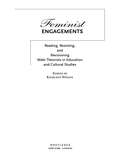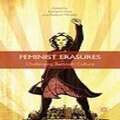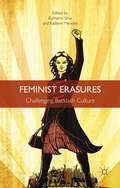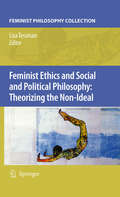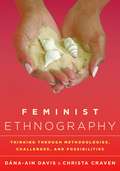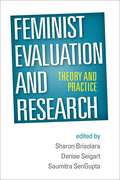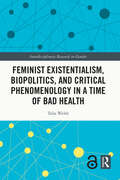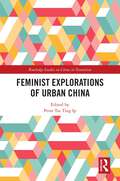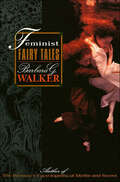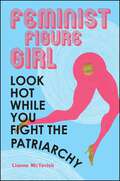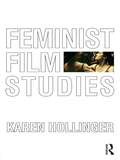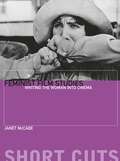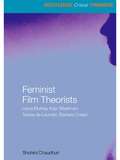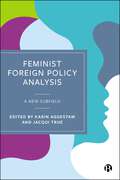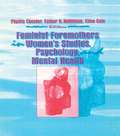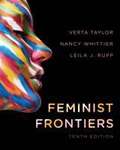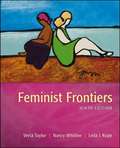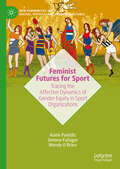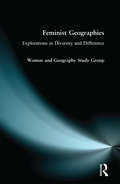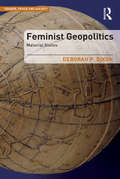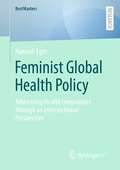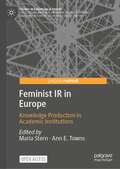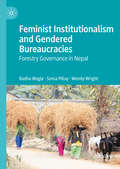- Table View
- List View
Feminist Engagements: Reading, Resisting, and Revisioning Male Theorists in Education and Cultural Studies
by Kathleen WeilerFeminist Engagements is a collection of essays by some of the top names in feminist education, in which they read and revision the works of the major twentieth-century theorists in education and cultural studies.
Feminist Erasures
by Kumarini Silva Kaitlynn MendesFeminist Erasures presents a collection of essays that examines the state of feminism in North America and Western Europe by focusing on multiple sites such as media, politics and activism. Through individual examples, the essays reveal the extent to which feminism has been made (in)visible and (ir)relevant in contemporary Western culture.
Feminist Erasures: Challenging Backlash Culture
by K. Silva K. MendesFeminist Erasures presents a collection of essays that examines the state of feminism in North America and Western Europe by focusing on multiple sites such as media, politics and activism. Through individual examples, the essays reveal the extent to which feminism has been made (in)visible and (ir)relevant in contemporary Western culture.
Feminist Ethics and Social and Political Philosophy: Theorizing the Non-Ideal
by Lisa TessmanFeminist Ethics and Social and Political Philosophy: Theorizing the Non-Ideal is a collection of feminist essays that self-consciously develop non-idealizing approaches to either ethics or social and political philosophy (or both). Characterizing feminist ethics and social and political philosophy as marked by a tendency to be non-idealizing serves to thematize the volume, while still allowing the essays to be diverse enough to constitute a representation of current work in the fields of feminist ethics and social and political philosophy. Each of the essays either serves as an instance of work that is rooted in actual, non-ideal conditions, and that, as such, is able to consider any of the many questions relevant to subordinated people; or reflects theoretically on the significance of non-idealizing as an approach to feminist ethics or social and political philosophy. The volume will be of interest to feminist scholars from all disciplines, to academics who are ethicists and political philosophers as well as to graduate students.
Feminist Ethnography: Thinking through Methodologies, Challenges, and Possibilities
by Christa Craven Dána-Ain Davis Davis CravenWhat is feminist ethnography? What is its history? How can its methods be applied? How is feminist ethnography produced, distributed, and evaluated? How do feminist ethnographers link their findings to broader publics through activism, advocacy, and public policy? Investigating these questions and more, this cross-cultural and interdisciplinary new text employs a problem-based approach to guide readers through the methods, challenges, and possibilities of feminist ethnography.
Feminist Evaluation and Research
by Saumitra Sengupta Denise Seigart Sharon BrisolaraThis thought-provoking book explores the 'whats,' 'whys,' and 'hows' of integrating feminist theory and methods into applied research and evaluation practice. Illustrative cases drawn from U.S. and international studies address a range of social and health issues. The book provides an overview of feminist theory and research strategies as well as detailed discussions of how to use a feminist lens, practical steps and challenges in implementation, and what feminist methods contribute to research and evaluation projects. Reflections at the close of each section invite the reader to consider key questions and common themes across the chapters. With a focus on social justice models, the book covers ways to conduct feminist research and evaluation in effective, innovative, and culturally competent ways in diverse social and cultural contexts.
Feminist Existentialism, Biopolitics, and Critical Phenomenology in a Time of Bad Health (Interdisciplinary Research in Gender)
by Talia WelshThis book explores the personal value of healthy behavior, arguing that our modern tendency to praise or blame individuals for their health is politically and economically motivated and has reinforced growing health disparities between the wealthy and poor under the guise of individual responsibility. We are awash in concerns about the state of our health and recommendations about how to improve it from medical professionals, public health experts, and the diet-exercise-wellness industry. The idea that health is about wellness and not just preventing illness becomes increasingly widespread as we find out how various modifiable behaviors, such as smoking or our diets, impact our health. In a critical examination of health, we find that alongside the move toward wellness as a state that the individual is responsible to in part produce, there is a roll-back of public programs. This book explores how this "good health imperative" is not as apolitical as one might assume. The more the individual is the locus of health, the less structural and historical issues that create health disparities are considered. Feminist Existentialism, Biopolitics, and Critical Phenomenology in a Time of Bad Health’s charts the impact of the increasing shift to a model of individual responsibility for one’s health. It will benefit readers who are interested to think critically about normalization to produce "healthy bodies." In addition, this book will benefit readers who understand the value of personal health, but are wary of the ways in which health can be used as a tool to discriminate and fuel inequalities in health care access. This volume is primarily of interest to academics, students, public health and medical professionals, and readers who are interested in critically examining health from philosophical perspective in order to understand how we can celebrate the value of healthy behavior without reinforcing discrimination.
Feminist Explorations of Urban China (Routledge Studies on China in Transition)
by Tsz Ting Ip, PennThis book explores gender topics related to social transitions and social struggles in the context of the urban transformations accompanying the evolving political economy of China’s New Era, here defined as the period since 2017.Analyzing a range of feminist perspectives, and empirically based feminist research, this book investigates the ways in which national policies and campaigns imposed under the discursive political framing of the New Era seep into the everyday lives of people, influencing how societies are transformed and how urban spaces, gendered social practices, lived experiences, and subjectivities are being (re)shaped and modified. Through explorations of these aspects of the New Era, this book reveals the new challenges and possibilities faced by different gendered social groups in contemporary Chinese society.Providing rich deliberations on gender topics related to urban developments in China’s New Era, this book will be of great interest to students and scholars of China studies, gender and women’s studies, and urban studies.
Feminist Fairy Tales
by Barbara G. WalkerProminent feminist author Barbara Walker has revamped, retold, and infused with life some of your favorite classic fairy tales. No longer are women submissive, helpless creatures in need of redemption through the princely male! Instead they are vibrantly alive, strong women who take fate into their own hands.
Feminist Family Values Forum
by Gloria Steinem Mililani Trask Angela Davis María JiménezThe purpose for our gathering is not to develop a homogenized feminist position, but rather to expand feminist discourse. Before it grows a leaf, a tree sends out an energy matrix. The inspiration, motivation, and greatest wish for this evening is to provide a forum for the kinds of issues and perspectives that are not represented fully in the media. This forum, coupled with the resource each of us presents in our collective intelligence, passion and commitment to advance the struggle for peace and liberation for all peoples can then move forward the process of clarification of our vision. This vision, by definition, must be multifaceted and informed by all of our various experiences. We are all trees developing our energy matrices, envisioning our lives as we wish them to be. As we put ourselves in the center of our powerful lives, we effect change all around us to the benefit of everyone and every living thing on the planet.
Feminist Figure Girl: Look Hot While You Fight the Patriarchy
by Lianne McTavishFeminist Figure Girl chronicles the transformation of art history professor Lianne McTavish, from a university professor into an extraordinarily tanned and crystal-encrusted bikini-wearing "figure girl."Figure competitions seek a softer appearance than traditional forms of bodybuilding but still require rigorous weightlifting, an extreme protein diet, and many hours of posing in high heels. While training for a figure show, McTavish combined autoethnographic methods, participant observation, and feminist theory to find new ways of thinking about physique culture and the female body.The author, who specializes in critical visual culture and the history of the body, explores such contemporary issues as body image, fat studies, identity politics, and "postfeminism," while rethinking fitness culture, diet regimes, feminist politics, reproductive activism, performance art, and the social function of photography. Written in a lively personal style reminiscent of McTavish's popular blog, she clearly explains the complex ideas stemming from the theoretical work of such writers as Judith Butler, Simone de Beauvoir, Michel Foucault, Iris Marion Young, Edmund Husserl, and Maurice Merleau-Ponty. The book also includes many photos documenting McTavish's physical transformation.
Feminist Film Studies
by Karen HollingerFeminist Film Studies is a readable, yet comprehensive textbook for introductory classes in feminist film theory and criticism. Karen Hollinger provides an accessible overview of women’s representation and involvement in film, complemented by analyses of key texts that illustrate major topics in the field. Key areas include: a brief history of the development of feminist film theory the theorization of the male gaze and the female spectator women in genre films and literary adaptations the female biopic feminism and avant-garde and documentary film women as auteurs lesbian representation women in Third Cinema. Each chapter includes a "Films in Focus" section, which analyzes key texts related to the chapter’s major topic, including examples from classical Hollywood, world cinema, and the contemporary period. This book provides students in both film and gender/women’s studies with a clear introduction to the field of feminist film theory and criticism.
Feminist Film Studies: Writing the Woman into Cinema
by Janet MccabeJanet McCabe is a lecturer in film studies at Trinity College, Dublin. She writes on feminist film theory and women's narrative/narration in quality American television.
Feminist Film Studies: Writing the Woman into Cinema (Short Cuts)
by Janet McCabeAn introduction to feminist film theory as a discourse from the early seventies to the present. McCabe traces the broad ranging theories produced by feminist film scholarship, from formalist readings and psychoanalytical approaches to debates initiated by cultural studies, race and queer theory.
Feminist Film Theorists: Laura Mulvey, Kaja Silverman, Teresa de Lauretis, Barbara Creed (Routledge Critical Thinkers)
by Shohini ChaudhuriFocusing on the ground-breaking work of Laura Mulvey, Kaja Silverman, Teresa de Lauretis and Barbara Creed, this book explores how, since it began in the 1970s, feminist film theory has revolutionized the way that films and their spectators can be understood. Examining the new and distinctive approaches of each of these thinkers, this book provides the most detailed account so far of their ideas. It illuminates the six key concepts and demonstrates their value as tools for film analysis: the male gaze the female voice technologies of gender queering desire the monstrous-feminine masculinity in crisis. Testing their ideas with a number of other examples from contemporary cinema and TV, Shohini Chaudhuri shows how these four thinkers construct their theories through their reading of films. An excellent study companion for all students of film theory and women’s studies.
Feminist Foreign Policy Analysis: A New Subfield
by Karen E. Smith Carol Cohn Rebecca Tiessen Claire Duncanson Fiona Robinson Jennifer Thomson Katarzyna Jezierska Klaus Brummer Elsa Hedling Ann Towns Annika Bergman Rosamond Ekatherina Zhukova Daniela Philipson Garcia Victoria Scheyer Columba Achilleos-Sarll Khushi Singh Rathore Katherine A.M. Wright Roberta Guerrina Farkhondeh AkbariHow can feminist scholarship advance the field of foreign policy analysis to better understand contemporary foreign policy actions and challenges? This groundbreaking book provides the state-of-the-art in the study of gender, feminisms and foreign policy. Bringing together contributors from around the world, chapters offer new analyses of foreign policy topics, including diplomacy, trade, defence, environment, peacebuilding, disinformation and development assistance. The book advances new theories, concepts and empirical knowledge for the emerging field of feminist foreign policy analysis. The book stands as a vital resource for scholars, students and practitioners seeking to understand and respond to the multifaceted gendered dynamics of global politics.
Feminist Foremothers in Women's Studies, Psychology, and Mental Health
by Phyllis Chesler Ellen Cole Esther D RothblumFeminist Foremothers in Women’s Studies, Psychology, and Mental Health is by and about the more recent wave of feminist foremothers; those who were awakened in the 1960s and ’70s to the realization that something was terribly wrong. These are the women who created the fields of feminist therapy, feminist psychology, and women’s mental health as they exist today. The 48 women share their life stories in the hope that they will inspire and encourage readers to take their own risks and their own journeys to the outer edges of human possibility. Authors write about what led up to their achievements, what their accomplishments were, and how their lives were consequently changed. They describe their personal stages of development in becoming feminists, from unawareness to activism to action. Some women focus on the painful barriers to success, fame, and social change; others focus on the surprise they experience at how well they, and the women’s movement, have done. Some well-known feminist foremothers featured include: Phyllis Chesler Gloria Steinem Kate Millett Starhawk Judy Chicago Zsuszanna Emese Budapest Andrea Dworkin Jean Baker Miller Carol Gilligan In Feminist Foremothers in Women’s Studies, Psychology, and Mental Health, many of the women see in hindsight how prior projects and ideas and even dreams were the forerunners to their most important work. They note the importance of sisterhood and the presence of other women and the loneliness and isolation experienced when they don’t exist. They note the validation they have received from grassroots feminists in contrast to disbelief from professionals. Although these women have been and continue to be looked up to as foremothers, they realize how little recognition they’ve been given from society-at-large and how much better off their male counterparts are. Some foremothers write about the feeling of being different, not meshing with the culture of the time and about challenging the system as an outsider, not an insider. These are women who had few mentors, who had to forge their own way, “hit the ground running.” Their stories will challenge readers to press on, to continue the work these foremothers so courageously started.Throughout the pages of Feminist Foremothers in Women’s Studies, Psychology, and Mental Health runs a sense of excitement and vibrancy of lives lived well, of being there during the early years of the women’s movement, of making sacrifices, of taking risks and living to see enormous changes result. Throughout these pages, too, sounds a call not to take these changes for granted but to recognize that feminists, rather than arguing over picayune issues or splitting politically correct hairs, are battling for the very soul of the world.
Feminist Frontiers
by Verta Taylor Nancy Whittier Leila J. RuppFeminist Frontiers: Rethinking Sex, Gender, and Society
Feminist Frontiers
by Verta Taylor Leila Rupp Nancy WhittierThe most widely used anthology of feminist writings, Feminist Frontiers has stood the test of time. Classic and contemporary readings on cutting-edge topics cut across disciplinary and generational lines, presenting the full diversity of women's lives and exploring commonalities and interconnected differences. Feminist Frontiers offers analyses of the causes and consequences of gender inequality in interaction with race, ethnicity, class, sexuality, ability, and nation, and introduces students to feminist theory and methodology. The ninth edition maintains a consistent coverage of diversity within a global perspective while highlighting the impact of new technologies on women's lives and experiences.
Feminist Futures for Sport: Tracing the Affective Dynamics of Gender Equity in Sport Organizations (New Femininities in Digital, Physical and Sporting Cultures)
by Simone Fullagar Adele Pavlidis Wendy O'BrienThis book examines the historical present as a turning point for women who are moving into traditional masculine cultures of team contact sports. The authors investigate how shifting gender dynamics are reshaping sports practices, organisations, and representations. They ask: What happens when women’s sporting bodies enter spaces that have historically excluded them? How is this change embodied, experienced, and navigated by athletes, stakeholders, and organizations within the broader sports ecosystem? And how does resistance to gender equality manifest in different forms? Exploring how the challenge of gender inequity materialises through the relations and actions that are transforming sport organisations in complex ways, the book suggests that change must be translated in time and space, recognising the global and local forces that shape the sociomateriality of sport practices, organisations and assemblages. The pursuit of gender equity in sport as a political, economic and cultural phenomenon, raises key questions about how ‘value’, ‘markets’, ‘space’ and ‘time’ materialise through gendered formations. In this way the authors articulate a feminist future of sport for the present.
Feminist Geographies: Explorations in Diversity and Difference
by Women Geography Study GroupIn recent years, the study of human geography has been reshaped by the work of feminist geographers, and as a result a considerable number of universities now include feminist geography and gender issues in their courses. This text provides an introduction to contemporary debates in feminist geography. These explorations in diversity and difference make up feminist geography in the 1990s. Feminist Geographies introduces key analytical concepts, examines the history of the subdiscipline, explores feminist geographers' methodologies and considers the various ways in which feminist geographers have worked with some of geography's key concepts; notably space, place, landscape and environment. The text also goes on to outline areas of future debates within the subject.
Feminist Geopolitics: Material States (Gender, Space and Society)
by Deborah P. DixonWhat can unfold from an engagement of feminist issues, concerns and practices with the geopolitical? How does feminism allow for a reconfiguration of how these two elements, the geo- and the -political, are understood and related? What kinds of objects can be located and put into motion? What kinds of relations can be drawn between these? What kinds of practice become valued? And, what is glossed or rendered absent in the process? In this thought-provoking and original contribution, Deborah P. Dixon cautions against the exhaustion of feminist geopolitics as a critique of both a classical and a critical geopolitics, and points instead to how feminist imaginaries of Self, Other and Earth allow for all manner of work to be undertaken. Importantly, one of the things they provide for is a reservoir of concerns, thoughts and practices that can be reappropriated to flesh out what a feminist geopolitics can be. While providing a much-needed, sustained interjection that draws out achievements to date, the book thus gestures forward to productive lines of inquiry and method. Grounded via a series of globally diverse case studies that traverse time as well as space, Feminist Geopolitics feels for the borders of geopolitical thought and practice by navigating four complex and corporeally-aware objects of analysis, namely flesh, bone, touch and abhorrence.
Feminist Global Health Policy: Addressing Health Inequalities through an Intersectional Perspective (BestMasters)
by Hannah EgerHealth inequalities, primarily driven by the structural determinants of health, are a major concern towards the global goal of health for all. A feminist global health policy has the potential to address the unequal distribution of power and to dismantle these imbalances. The prioritisation of intersectional, holistic, human rights-based approaches intends to advance health equality and reproductive justice. This research examined the contours and potentials of a feminist global health policy by developing a framework. Online focus groups were conducted with participants affiliated to either the global-academic or local-activist level, envisaging global representation. The elaborated framework provides a nexus between the global and the local level, by entailing universal principles as well as recommendations and sensitivity for context-specific adaptations. Community and policymakers are identified as key actors. This research aims to stimulate a debate on feminist global health policy and the potential of this framework with regard to health equality and reproductive justice.
Feminist IR in Europe: Knowledge Production in Academic Institutions (Trends in European IR Theory)
by Maria Stern Ann E. TownsThe aim of this open access book is to take stock of, critically engage, and celebrate feminist IR scholarship produced in Europe. Organized thematically, the volume highlights a wealth of excellent scholarship, while also focusing on the politics of location and the international political economy of feminist knowledge production. Who are some of the central feminist scholars located in Europe? How might the concentration of these scholars in Northern Europe and the UK shape the contents of their scholarship? What have some of the main contributions been, in the study of the following themes: security; war and military; peace; migration; international political economy and development; foreign policy; diplomacy; and global governance and international organizations? The volume offers both an intellectual history and a sociology of feminist IR scholarship in Europe. It showcases the vitality and breadth of feminist IR traditions, while simultaneously calling attention to their partial nature, exclusions and silences.
Feminist Institutionalism and Gendered Bureaucracies: Forestry Governance in Nepal
by Soma Pillay Wendy Wright Radha WagleThis book examines the processes for the inclusion of women, and the role of women employees in Nepal’s forestry bureaucracy. The book adopts a “gender lens” drawn from feminist institutionalism and is framed around the following four objectives: evaluating the effectiveness of current legislative and policy frameworks for the inclusion of women in the Nepalese forest bureaucracy; examining the dynamics of organizational culture, formal and informal institutions, and structure and agency in and around forest bureaucracy in Nepal; assessing power relations in forestry institutions focusing on influential participation of women forestry professionals in the bureaucratic structure; and gaining insights about the alternative space of feminist institutionalism in connection with women inclusive forest bureaucracy.Findings in the book inform and extend feminist institutionalism perspectives by applying it to a context which remains under explored, providing insights on the efficacy of public sector cultural change, especially as it relates to those areas within bureaucracies less in a position to adopt the changes mandated by society and principles of good governance.
